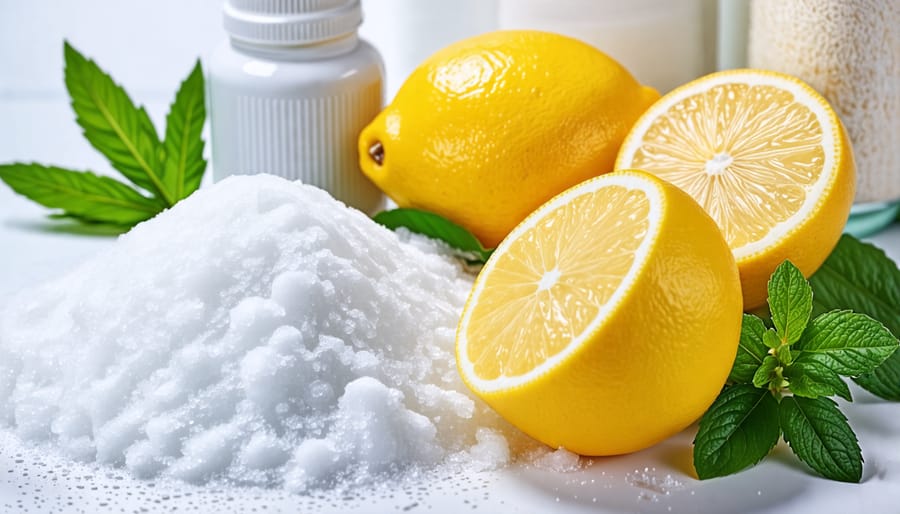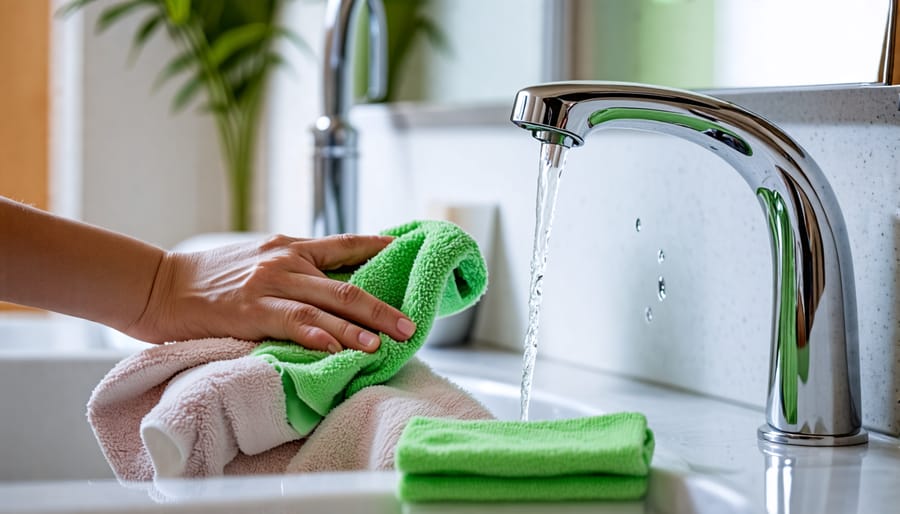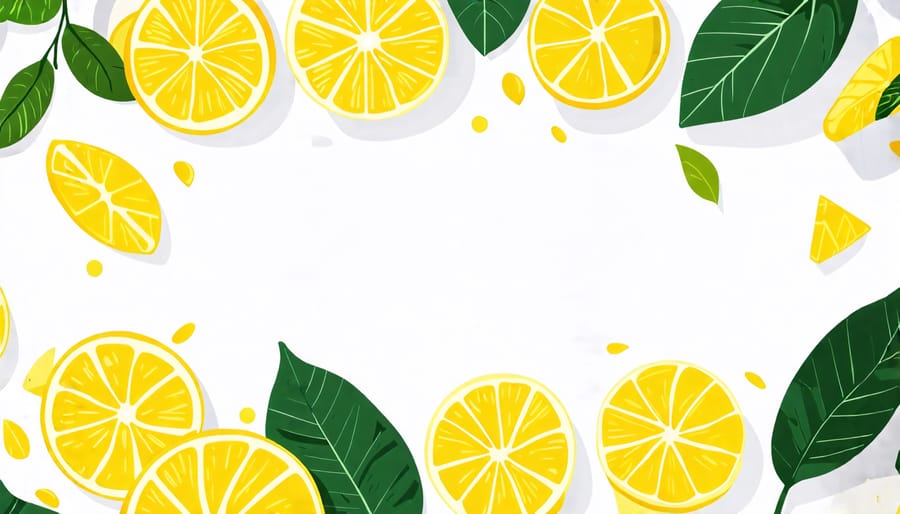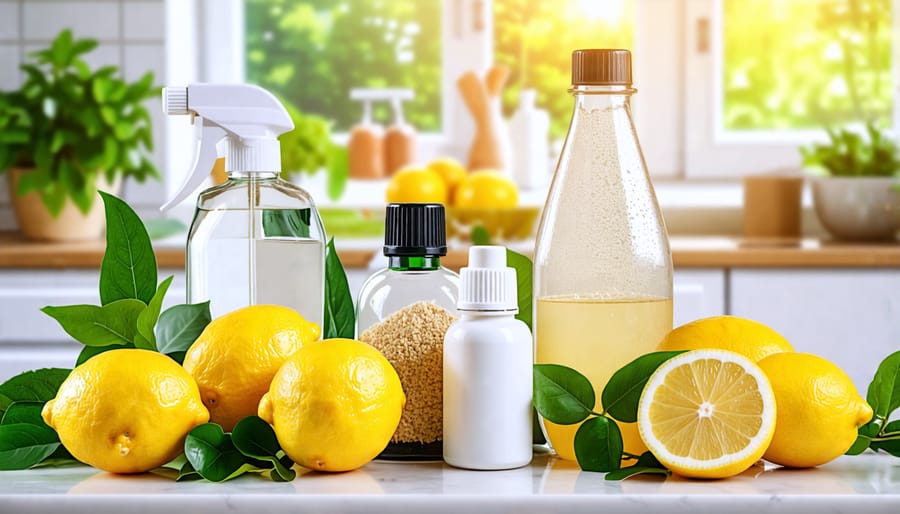Swap out toxic cleaning products for natural, homemade alternatives that harness the power of ingredients like white vinegar, baking soda, and lemon juice to tackle the benefits of eco-friendly cleaning. Invest in reusable tools like microfiber cloths, cotton cleaning rags, and scrub brushes to cut down on disposable paper towel and sponge waste. Adopt a minimalist cleaning approach – declutter regularly, clean as you go, and focus your deep cleaning efforts on high-impact areas to reduce the overall need for frequent, intensive cleaning sessions.

Natural All-Purpose Cleaners
Basic Vinegar Solution
A versatile vinegar cleaning solution is easy to make at home. Simply mix equal parts white vinegar and water in a spray bottle. For tougher jobs, you can increase the vinegar to water ratio. This non-toxic cleaner effectively tackles grease, grime, and odors on a variety of surfaces like countertops, sinks, and floors. The acetic acid in vinegar cuts through dirt, while its antimicrobial properties help disinfect. Apply the solution, let it sit for a few minutes, then wipe clean with a cloth or sponge. Vinegar is a powerful, affordable, and eco-friendly alternative to harsh chemical cleaners.
Baking Soda Scouring Paste
For a gentle abrasive cleaner, mix baking soda with just enough water to form a paste. This versatile mixture can tackle grimy sinks, tubs, and countertops without scratching surfaces. Apply the paste with a damp sponge or cloth, scrub in circular motions, and rinse thoroughly with water. For extra cleaning power on tough stains, let the paste sit for several minutes before scrubbing. Baking soda’s mild alkalinity helps dissolve dirt and grease, while its fine texture polishes surfaces to a shine. This simple, eco-friendly solution is a great alternative to harsh commercial scouring creams.
Citrus Enzyme Cleaner
Here’s a simple DIY cleaner that harnesses the power of citrus: Fill a jar with citrus peels, like lemon, lime, or orange. Cover the peels with white vinegar and let it sit for 2-3 weeks, allowing the citrus oils to infuse into the vinegar. Strain out the peels and dilute the solution 1:1 with water in a spray bottle. This natural cleaner works wonders on grease, grime, and odors around the kitchen and bathroom. The citrus oils provide extra degreasing power and a fresh scent. It’s an easy, eco-friendly alternative to harsh chemical cleaners.

Tackling the Bathroom
Toilet Bowl Freshener
Here’s an easy, eco-friendly way to keep your toilet bowl fresh and clean. Mix 1 cup of baking soda with 1/3 cup of distilled water until a thick paste forms. Add 15-20 drops of your favorite essential oil, like tea tree or lavender, for a pleasant scent. Spoon the mixture into an ice cube tray and let it dry overnight. Once hardened, pop out the tabs and store them in an airtight container. To use, simply drop a tab into the toilet bowl and let it fizz away, releasing its deodorizing and cleaning properties. This natural alternative to commercial fresheners is cost-effective and helps reduce plastic waste. Plus, you can customize the scent to your liking!
Tub and Tile Cleaner
Tackle grime and soap scum in your tub and on tile with a simple, eco-friendly solution. Mix a few tablespoons of castile soap with warm water in a spray bottle. Spray down surfaces, let sit for a few minutes, then scrub with a soft sponge or brush. For tough stains, sprinkle baking soda on the area first, then spray with the castile soap mixture and scrub. Rinse well with water and dry with a clean cloth. This gentle yet effective combination will leave your bathroom sparkling without harsh chemicals. As a bonus, castile soap is biodegradable and non-toxic, making it safe for your family and the environment. With regular use, you’ll maintain a clean, fresh bathroom while being kind to the planet.
Green Kitchen Cleaning
Degreasing Kitchen Surfaces
When tackling greasy kitchen surfaces, put away the harsh chemicals and turn to nature’s cleaning powers instead. Cut a lemon in half and sprinkle salt generously on the cut side. Then, use the lemon half as a scouring pad to scrub greasy stovetops, countertops, and backsplashes. The salt provides gentle abrasion while the lemon’s acidity cuts through the grime. For tougher grease buildups, sprinkle baking soda on the surface first, then scrub with the salted lemon. The combination of these natural ingredients will leave your kitchen surfaces sparkling clean and smelling fresh, without any harmful residues. Rinse the area with a damp cloth or sponge after scrubbing, and enjoy your naturally degreased kitchen!
Refreshing the Fridge
If your fridge smells less than fresh, ditch the harsh chemicals and try these natural deodorizing methods. Place an open container of coffee grounds on a shelf to neutralize odors. The grounds will absorb the unpleasant smells, leaving your fridge smelling clean and fresh. For a sweeter scent, soak a cotton ball in vanilla extract and place it on a small dish in the fridge. The vanilla essence will gently perfume the interior while combating any lingering odors. Replace the coffee grounds or vanilla-soaked cotton ball every couple of weeks for continuous freshness. With these simple, eco-friendly techniques, you can confidently open your fridge door without any olfactory assaults and feel good about minimizing your environmental impact in the process.
Natural Laundry Boosters

Whitening with Lemons
Brighten your whites naturally with the power of lemon and sunshine! Mix 1/2 cup of lemon juice with a gallon of hot water in a large basin or tub. Submerge your white items and let them soak for at least an hour. For extra cleaning power, add a 1/2 cup of baking soda to the mix. After soaking, wring out the excess water and hang your items in direct sunlight. The natural bleaching properties of lemon juice, combined with the sun’s UV rays, will leave your whites brilliantly clean and fresh without any harsh chemicals. Repeat as needed for stubborn stains or yellowing.
Softening with Vinegar
Looking for a natural fabric softener alternative? White vinegar is an effective and eco-friendly option. Simply add 1/2 cup of white vinegar to the fabric softener dispenser or a small cup during the rinse cycle. Vinegar helps remove soap residue, softens fabrics, and reduces static cling. Don’t worry about any lingering vinegar smell – it dissipates as the laundry dries. For extra freshness, you can add a few drops of your favorite essential oil to the vinegar before using it in the wash. This simple swap is an easy way to make your laundry routine more sustainable without sacrificing soft, fresh-smelling clothes.
Cleaning with Essential Oils
Lemon Oil Dusting Spray
Repel dust and add a fresh scent to your home with this simple lemon oil dusting spray. In a spray bottle, combine 1 cup of water, 1/4 cup of white vinegar, and 10-15 drops of lemon essential oil. Shake well before each use. Spritz the solution lightly onto a microfiber cloth and wipe down surfaces, such as furniture, baseboards, and window sills. The vinegar helps cut through grime, while the lemon oil leaves a pleasant aroma and helps to repel dust. This natural alternative to chemical-laden dusting sprays is easy to make and effectively keeps your home clean and fresh.
Tea Tree Mold Remover
Tea tree oil is a natural wonder for fighting mold growth in your home. To harness its power, mix 1 teaspoon of tea tree oil with 1 cup of water in a spray bottle. Shake well and spray the solution directly onto moldy surfaces, such as bathroom tiles or shower curtains. Let it sit for an hour, then wipe clean with a damp cloth or sponge. The tea tree oil will penetrate the mold, killing it and preventing future growth. For tough mold stains, you can also make a paste using 1 drop of tea tree oil mixed with baking soda. Apply the paste, let it dry, then scrub away for a sparkling clean surface. With regular use, tea tree oil can help keep your home mold-free the natural way.
Air Freshening Alternatives
Simmering Stovetop Scents
Simmer a pot of water on the stove with natural ingredients to infuse your home with a pleasant aroma. Try combining sliced lemons, rosemary sprigs, and a splash of vanilla extract for a fresh, clean scent. Or, create a warm, inviting atmosphere with a blend of cinnamon sticks, orange peels, and a few drops of clove essential oil. Experiment with different combinations of herbs, spices, and fruit peels to discover your favorite stovetop scent. Not only will your home smell wonderful, but you’ll also avoid the harsh chemicals found in many commercial air fresheners.
Baking Soda Carpet Refresher
Baking soda is a natural and effective way to freshen up your carpets without harsh chemicals. Simply sprinkle a generous amount of baking soda over your carpet, focusing on areas that tend to trap odors like high-traffic zones or pet lounging spots. Use a soft-bristled brush to work the baking soda deep into the carpet fibers, then let it sit for at least 15 minutes – or overnight for extra deodorizing power. Vacuum thoroughly to remove the baking soda, along with the trapped odors and dirt. This simple trick will leave your carpets smelling fresh and clean the eco-friendly way.
Conclusion
Adopting eco-friendly cleaning habits offers numerous benefits for both your home and the planet. By using natural, non-toxic ingredients, you can create a healthier living environment for your family while reducing your environmental impact. These simple and effective cleaning tips not only tackle dirt and grime but also help you save money on expensive cleaning products. With a little effort and creativity, you can transform your cleaning routine into a sustainable and rewarding practice. So why not give these eco-friendly techniques a try? Start small by incorporating a few tips at a time, and soon you’ll be on your way to a greener, cleaner home that you can feel good about.





